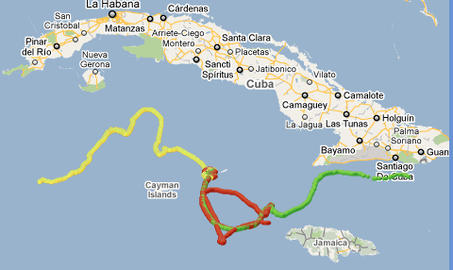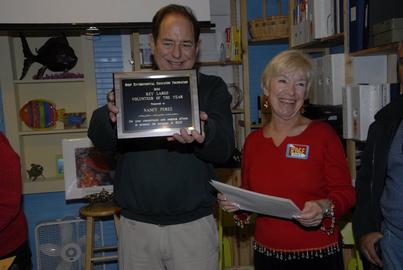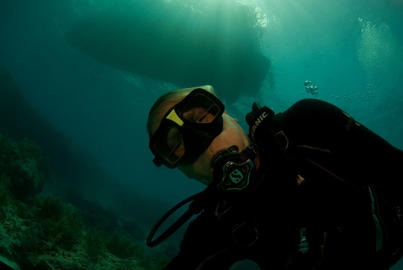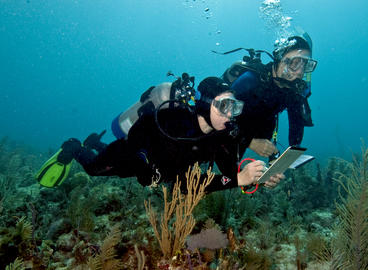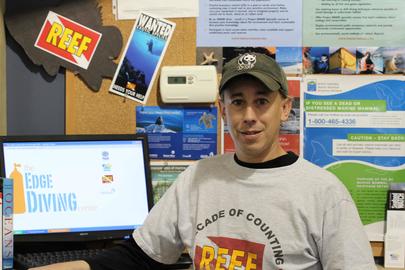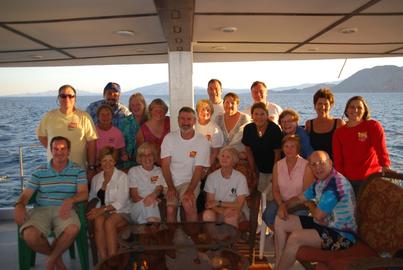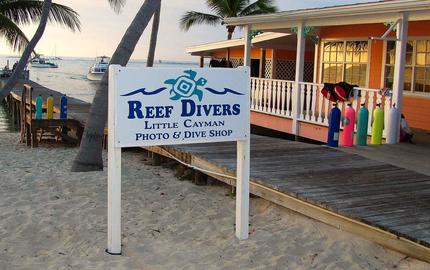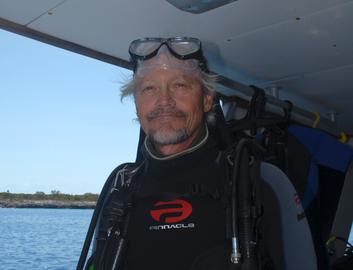As part of the Grouper Moon Project, REEF launched the Baby Grouper Adrift! webpage in late February. We developed this outreach tool to display in real time the results of state-of-the-art satellite drifter research being conducted by researchers from REEF, the Cayman Island Department of Environment, and Oregon State University. The Adrift project aims to better understand where Nassau grouper larvae end up after being spawned.
REEF recently awarded Nancy Perez the 2010 Key Largo Community Volunteer Award. Nancy joined during REEF's inaugural year in 1993! She lives in the Florida Keys and has become an instrumental volunteer at REEF Headquarters in Key Largo. Nancy helps connect REEF with the local community through planning special events, including holiday parties, the James E. Lockwood REEF Headquarters dedication, and participation at local festivals. Nancy has also encouraged other locals to volunteer at REEF HQ and is always available to assist REEF staff on projects.
Every month, scientists, government agencies, and other groups request raw data from REEF’s Fish Survey Project database. Here is a sampling of who has asked for REEF data recently and what they are using it for:
- An educator and researcher from the University of Connecticut is using data as part of a field science class. His students will use the data to evaluate fish populations in advance of their field coursework.
REEF members are at the heart of our grassroots marine conservation programs. Over 43,000 divers, snorkelers, students, and armchair naturalists stand behind our mission.
This month we highlight Franklin Neal (REEF member since 2000). Franklin and his wife Cassandra (also an active REEF member) spend much of their time in Bonaire these days, but they originally called New York home. Franklin has conducted 1,179 REEF surveys! and he is a member of the Advanced Assessment Team in the Tropical Western Atlantic. Here's what Franklin had to say about REEF:
REEF is proud to partner with over 130 dive shops, dive clubs, individuals, and other organizations as REEF Field Stations.
Every month, scientists, government agencies, and other groups request raw data from REEF’s Fish Survey Project database. Here is a sampling of who has asked for REEF data recently and what they are using it for:
- A collaborator from the Global Underwater Explorers Project Baseline initiative is using REEF data to document environmental conditions in the Florida Keys.
- NOAA scientists requested data to help develop biogeographic assessment products for the Florida Reef Tract from Martin County to the Dry Tortugas.
Following on the heels of our milestone in Hawaii in January of reaching 10,000 surveys, the REEF Survey Project saw its 20,000th survey submitted from the Pacific Coast Region. Divers from California to the Pacific Northwest have been conducting surveys on fish, invertebrates, and algae since 1997. Over 1,300 sites have been surveyed and 1,554 volunteers have participated. Mike Delaney conducted the lucky 20k survey at Whitecliff Park in British Columbia on February 4th, 2011! Congratulations Mike!
There are a few Field Survey trips in 2011 with spaces available. Please consider joining us in one of these great destinations – Maui, Roatan, and the Bahamas. These trips offer a great introduction to fish identification for novice fishwatchers, and are a fun way for experienced surveyors to build their life list while interacting with fellow fishwatchers. REEF staff lead these trips, and each features daily classroom seminars and a full diving schedule.
REEF is proud to partner with over 130 dive shops, dive clubs, individuals, and other organizations as REEF Field Stations.
REEF members are at the heart of our grassroots marine conservation programs. Over 43,000 divers, snorkelers, students, and armchair naturalists stand behind our mission.
This month we highlight Doug Harder (REEF member since 1996). Doug lives in Monument, Colorado, and has conducted 759 REEF surveys. Doug is a member of the Advanced Assessment Team in both the Tropical Western Atlantic and Hawaii. Here's what Doug had to say about REEF:
What inspires you to do REEF Surveys?

